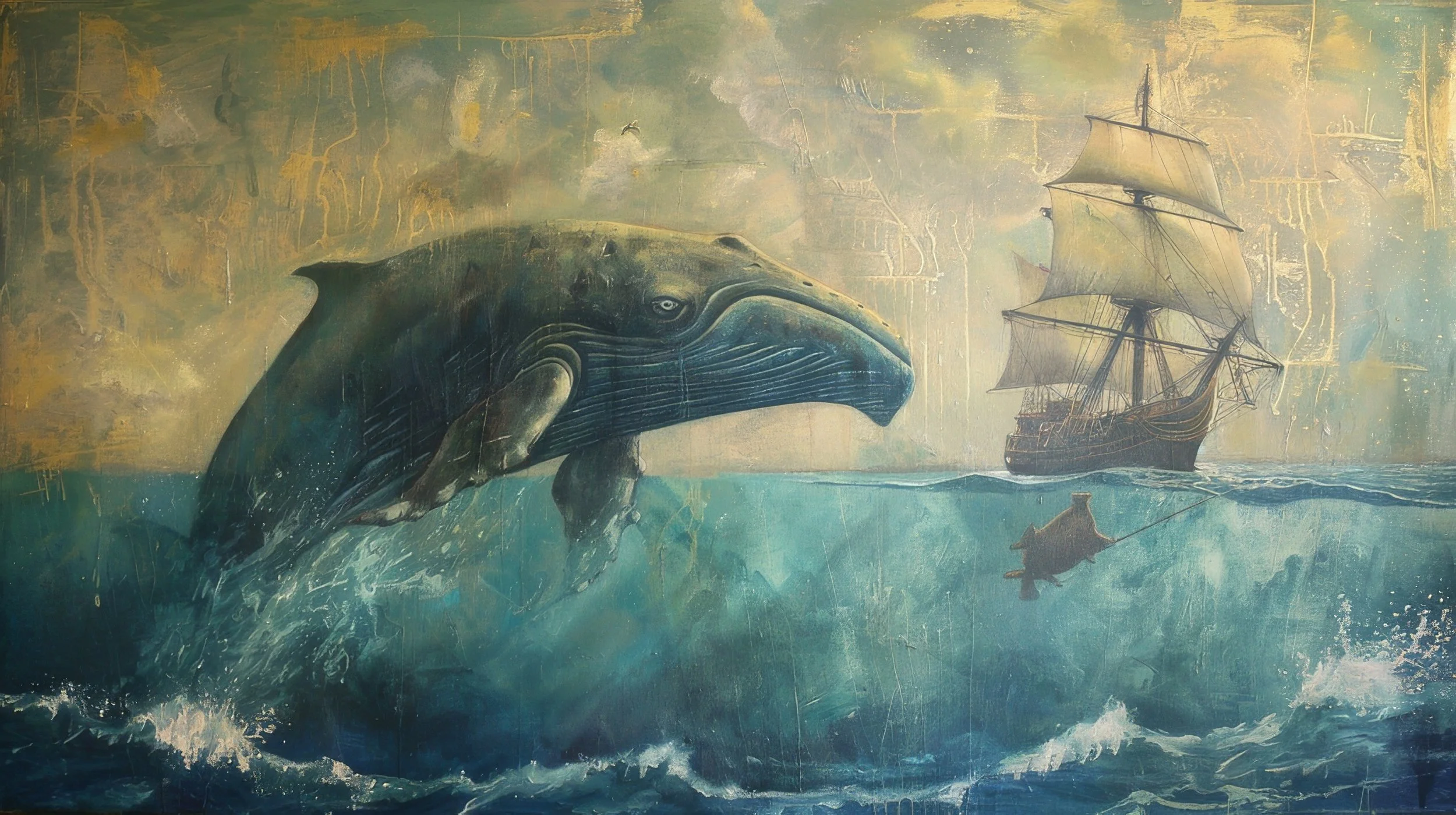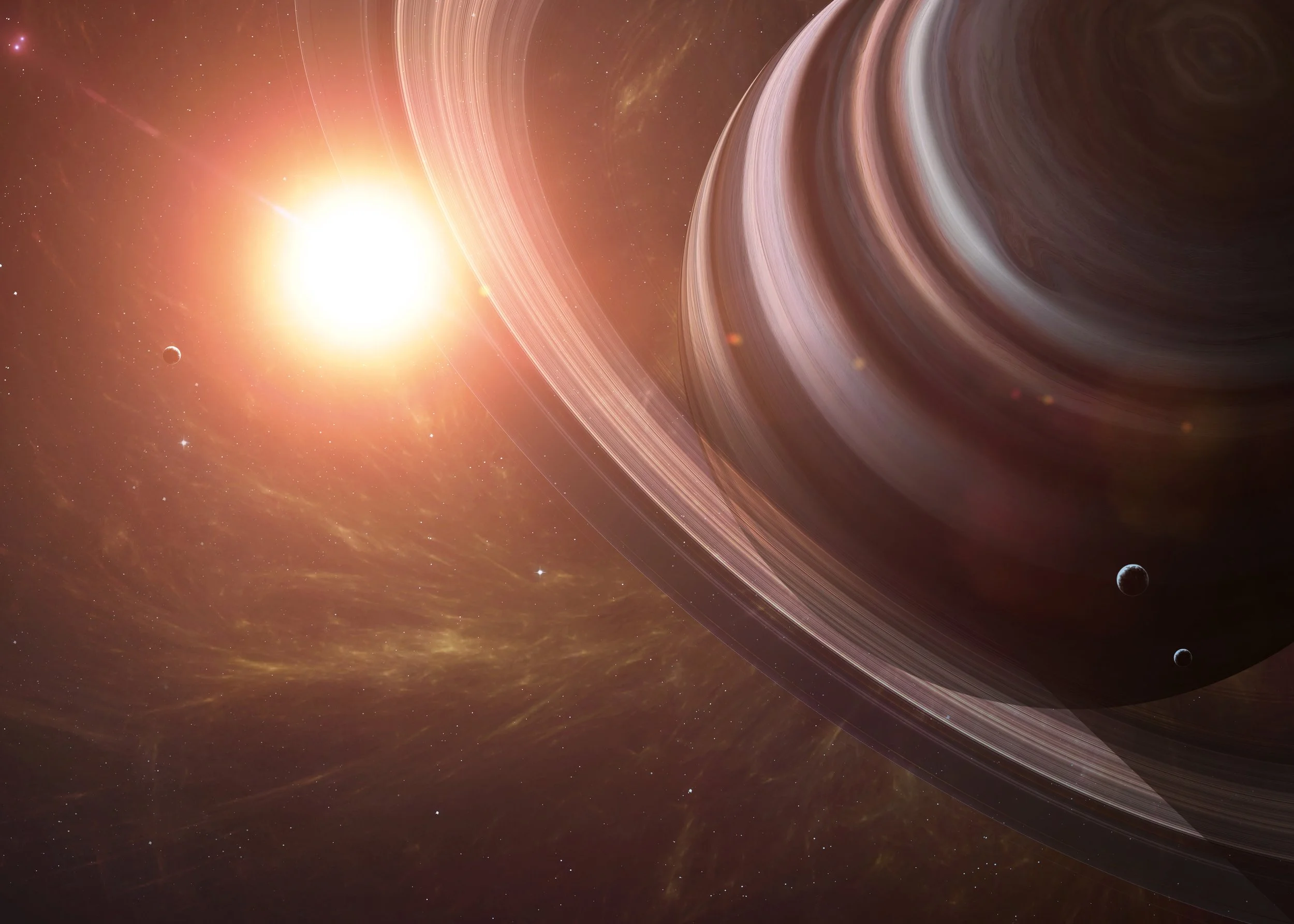Taurus III: Growth amid Saturn’s Trials
We’ve arrived at the third decan of Taurus, a pivotal part of the zodiac that blends the grounded, fixed energy of Taurus with the disciplined, reflective influence of Saturn. As part of this 36-part series on the decans in astrology, this post explores the unique themes of Taurus III: perseverance, limitation, and the cycles of growth and loss that define this decan’s energy. Saturn, as its planetary ruler, brings lessons of hard work and humility, reminding us to find meaning and strength in life’s challenges.
In the video attached, I delve into the esoteric wisdom of Taurus III, its connection to the Seven of Disks tarot card (Failure in the Thoth deck), and the symbolism of Saturn’s sickle. I also explore how these themes are reflected in the life and work of Herman Melville, particularly in Moby Dick, and in the life of Toni Morrison, whose resilience and adaptability exemplify the energy of this decan. Both Melville and Morrison have their rising signs in Taurus III.
Below the video, you’ll find a transcript that I’ve rewritten and expanded to include additional insights into the astrology, tarot, and numerology of Taurus III. Whether you prefer to watch, read, or do both, this post provides a deeper understanding of how this decan reflects the human journey of striving, adapting, and finding purpose amidst trials.
Transcript (modified and expanded)
Today, I’m continuing my exploration of the 36 Decans of the Zodiac with Taurus III, the third decan of Taurus. Taurus is an earth sign ruled by Venus, the goddess of love, beauty, social justice, but also of value and resources—the way we attract and manage material abundance. It’s a fixed sign, which means it has steady, grounded energy.
All the decans of Taurus share themes of financial stability and finding solid ground, thanks to the earthy energy of Taurus combined with Venus’s influence. Taurus energy is about perseverance and hard work—that steady, plodding effort symbolized by the Bull. But the third decan of Taurus is unique because its ruling planet is Saturn. Saturn’s influence brings a heavier, more serious tone to this decan compared to the Venusian energy of the others. In both the Triplicity System and the Chaldean Order, Saturn is the planet that governs Taurus III. And Saturn has a reputation: heavy, dark, cold, and challenging. It’s a planet of boundaries, restrictions, and lessons that are learned through hard work and perseverance.
Saturn’s Energy in Taurus III
Saturn is a heavy planet—literally and symbolically. It’s the furthest planet we can see with the naked eye, and it has a ring around it, which makes it a symbol of boundaries and restrictions. Saturn marks the outermost edge of what’s visible and tangible, separating the known from the unknown. Its cold, dark, and distant nature contrasts sharply with the warmth and brightness of the Sun.
Saturn’s energy is about responsibility, limitation, and hard-earned wisdom. It can feel heavy, even oppressive at times, bringing fear, doubt, and a sense of scarcity. But Saturn isn’t just about hardship—it’s also about growth through perseverance. It teaches us that through effort, discipline, and endurance, we can achieve great things. Saturn demands that we face life’s realities and work within its boundaries, rather than ignoring them.
Saturn is also associated with death and endings. Its symbol is the sickle, which is also the Grim Reaper’s tool. In ancient times, the sickle was used to cut crops—symbolizing a cycle of death and rebirth. The crops die, people eat, and life goes on. This cyclical energy is embedded in this decan. Death, endings, and even fear of loss are present here, but there’s also a deeper understanding that endings make room for new beginnings.
The Seven of Pentacles, Rider-Waite Tarot
The Seven of Pentacles, tied to the third decan of Taurus, is a card of reflection, patience, and perseverance. It depicts a farmer standing over his crop, assessing the fruits of his labor. This imagery captures a moment of pause—between effort and reward—where the outcome remains uncertain. There’s an understanding that fate might intervene. A storm could destroy the crop overnight, and all his work could be undone.
7 of Pentacles, Rider-Waite Tarot
This card reflects a relationship with the creative process that is both active and passive. We put in the work, but we must also surrender, knowing that external forces may disrupt our plans.
Austin Coppock, in his course on the decans, notes that individuals with planets in Taurus III may have a connection to industries like insurance. This makes sense, as the energy of this decan involves recognizing that fate can intervene, leading to loss, and wanting to protect against that possibility. In practice, I’ve found this to be true— people with Taurus III placements sometimes work in the insurance industry or related fields.
The Spiritual Aspect: The Number Seven
The number of the tarot card associated with this decan, seven, brings in an added layer to the meaning of the card. In the Hermetic Qabalah, seven is associated with the Sephira of Netzach, which represents endurance, victory, emotional resilience, and the creative forces of nature. It’s the union of the spiritual and material worlds.
The number seven also appears in the Bible, where it represents the completion of divine creation—“the world was created in seven days.” Netzach represents the merging of the spiritual and material realms. The creative forces of Netzach are not merely about artistic inspiration—they are about bringing divine energy into physical form.
Sevens have a longing to connect with the divine, a longing to bridge the gap between the mundane and the sacred, to bring the divine (or higher meaning) into the material world. People with planets in this decan may be challenged to persevere through trials and to seek a deeper connection with the divine. It’s about finding faith, endurance, and meaning in the struggle.
The Thoth Deck: “Failure”
In the Thoth deck, the card associated with this decan is the 7 of Disks, called Failure. The imagery is dark and heavy, highlighting Saturn’s influence as the planet of limitation, delay, and structure. The muted, earthy tones evoke stagnation and loss, symbolizing the inevitability of failure when material efforts fall short or when external forces intervene.
7 of Disks, “Failure,” Thoth Tarot
The uneven arrangement of the disks reflects imbalance and highlights the emotional toll of disappointment or frustration. Yet, this card is not purely negative—it carries a lesson. It asks how we respond to setbacks: Do we despair, or do we adapt and persevere? In Taurus III, this card emphasizes humility, patience, and the wisdom gained through life’s challenges, reminding us that even failure holds value.
This decan invites us to reflect on the balance between effort and surrender, between striving for material security and accepting the unpredictable nature of life. It’s a deeply grounded energy, reminding us that while we can work hard, there’s always an element of fate that lies beyond our grasp. This tension shapes the lives of those influenced by Taurus III, as we’ll see in the stories of individuals like Toni Morrison.
“Failure” and Herman Melville’s “Moby Dick”
In Taurus III, failure is not the end of the story—it’s where the real questions begin. When faced with failure, do we give up and let it destroy us, like Captain Ahab in Moby-Dick, or do we adapt, observe, and make a different choice, like Ishmael? This tension is at the heart of Herman Melville’s masterpiece, and it’s no coincidence that Melville himself has his rising degree in Taurus III. His life and work exemplify the lessons of this decan: the struggle to persevere through limitations, the humility to adapt, and the wisdom to find meaning in hardship.
Ishmael, the observing narrator and survivor of the story, embodies the adaptability and resilience of Taurus III. When the Pequod sinks, Ishmael saves himself by using Queequeg’s coffin as a buoy. This coffin is rich with symbolic meaning—it reflects Queequeg’s acceptance of mortality and his intuitive understanding of life’s cycles. Saturn’s influence over this decan brings an awareness of boundaries, endings, and the inevitability of change. Ishmael’s willingness to align with these truths, rather than fight against them, ensures his survival. In contrast, Captain Ahab represents the destructive consequences of resisting Saturn’s lessons. His refusal to accept limitation and his obsessive determination to conquer the unconquerable lead to his downfall, illustrating what happens when ego overrides humility.
Melville’s own life mirrors the themes of Taurus III. His literary career was marked by setbacks, including the initial failure of Moby-Dick. Yet, like Ishmael, Melville endured. His perseverance and deep exploration of human struggle reflect the Saturnian qualities of this decan—effort, introspection, and resilience. Moby-Dick itself is a testament to the energy of Taurus III, weaving together the material and the spiritual, the personal and the universal, to ask deep questions about how we face life’s trials.
Toni Morrison: Perseverance and Adaptation
Toni Morrison is another example of Taurus III energy. She grew up in a working-class family, facing systemic racism and limited opportunities. Despite these challenges, she pursued her education, earning a master’s degree while raising her children as a single mother. She had to balance parenting, working as an editor, and finding time to write—often in the early mornings before her day began.
.
Morrison’s life reflects the perseverance and discipline of Saturn. She didn’t let her challenges hold her back. Instead, she used them as fuel to build a remarkable career. Her hard work paid off—she became one of the most celebrated authors of our time, winning the Nobel Prize for Literature.
One of her quotes perfectly captures the essence of this decan: “If you surrender to the air, you can ride it.” That’s the lesson of Taurus III—adapting to life’s realities, finding your moment, and making the most of it. Morrison’s story shows how the Saturnian energy of hard work and perseverance can lead to lasting success.
Concluding Thoughts
Taurus III is a decan of hard work, resilience, and the wisdom that comes from facing life’s limits. Whether it’s Melville’s characters, the farmer in the Seven of Pentacles, or Toni Morrison’s life, the lesson is the same: adapt, persevere, and draw strength from the struggle. Saturn teaches us to work with life’s boundaries, not against them. And when we do, the rewards can be significant.
If this resonates with you, feel free to drop a comment and share your thoughts. I’d love to hear how this energy shows up in your life. And stay tuned—next time, we’ll dive into Gemini I. Thanks for watching!






